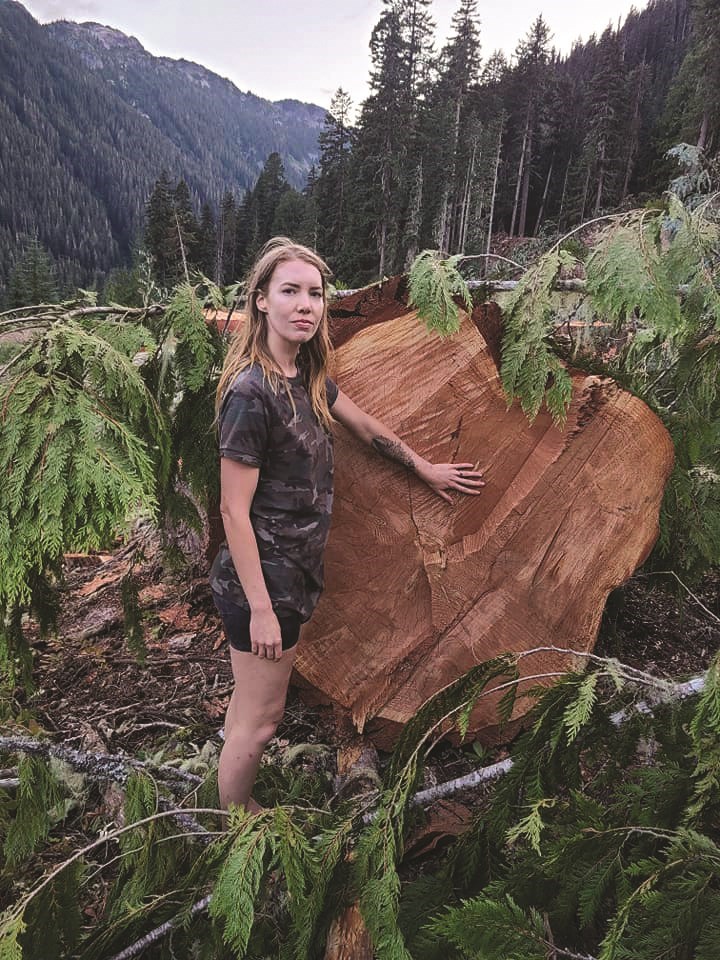Before heading to Fairy Creek last spring for the blockades against old-growth logging that captured international headlines, Emily Kane’s closest brush with the law was what she described as “a mild speeding ticket.”
That changed on May 27, 2021 when the local business owner was arrested and forcibly removed by the RCMP after locking herself into a “sleeping dragon”—essentially a hole in the ground reinforced by concrete and piping that protesters have locked themselves into throughout the blockades.
Initially, Kane was charged with civil contempt of an injunction. Just weeks after her arrest, however, the charge was upgraded to criminal contempt, after the B.C. Prosecution Service agreed to review the cases of more than 400 Fairy Creek protestors allegedly breaching a court-ordered injunction granted to forestry company Teal Jones. The upgrade meant she faced a possible criminal record, along with 24 days in jail.
“For me, that seemed surprising as a peacefully resisting [protester] and especially considering the circumstances, considering we have rights as citizens to peacefully protest,” said Kane.
Fortunately for the Yogacara Whistler owner, the judge in her case showed some leniency, reducing her sentence to a $2,250 fine and no jail time.
Although understandably relieved to avoid a harsher penalty, Kane was prepared for the possibility of prison if it came to that.
“I knew people were getting arrested at Fairy Creek and I also knew that we’re in a climate and biodiversity crisis. When there is less than 2.7 per cent of these [old-growth] trees left in forested areas, that’s urgent. That’s an urgent cause,” she said. “If we don’t do something about it, we’re going to lose them. From my perspective, my potential loss and my consequences didn’t matter compared to that loss.”
For Kane, the choice to head to Fairy Creek was an easy one. But she still questions why the blockades—the largest act of civil disobedience in Canadian history—were even necessary in the first place.
“These people, myself included, don’t have malicious intent. I didn’t want to break the law,” she said. “We are here to make sure we don’t lose this ancient ecosystem that we all need for numerous reasons. It’s unfortunate. I didn’t want to have to do what I did but there’s no other choice when the government hasn’t acted. This is the last option we have.”
Kane, a young white woman, also recognizes things could have gone much differently for her, both with her arrest—she described the RCMP as respectful throughout—and with her reduced sentence. Other Fairy Creek protestors haven’t been so lucky.
“The biggest thing for me was to recognize that privilege in the arrest itself. After hearing the stories and seeing the video footage and understanding what some marginalized people went through, I think that in itself was a huge eye-opener,” she said. “I also recognize that the experiences I just went through, even the fact that I was able to have a management team to support me while I was gone [to Fairy Creek], have my husband help me while I was gone, if I did end up going [to jail], I recognize those are huge privileges and I recognize not everyone has those options.”
As the spotlight has dimmed on Fairy Creek, Kane is keen to renew attention on old-growth logging, not just there, but across the province.
“This isn’t an incident isolated to Fairy Creek. This is happening across B.C. It’s happening in our backyard and if we don’t do something about it, we are going to lose these precious spaces together,” she said. “We have a responsibility—and I know I sound like a broken record—to hold the government accountable to their promises. We’re Beautiful British Columbia, we should be able to preserve these forests for future generations. If we make these mistakes now, the future generations are going to bear the brunt of those poor decisions and there’s a very limited time to [take action] before it’s too late.”


